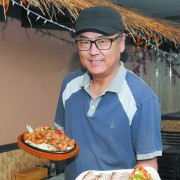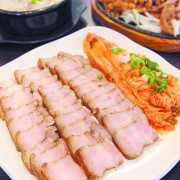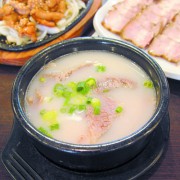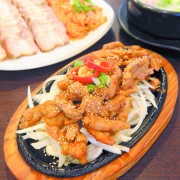It’s no secret that as consumers, we like when things are real. From designer handbags to diamond rings, the authenticity of a product is often one its most valuable assets.
Nowhere does this hold especially true than the culinary world. Equipped with recipes that date back to the Joseon Dynasty, Chogajib offers customers the quintessential traditional Korean dining experience.
“We try to stick as close to real Korean-style cooking as possible,” says Jeong Rok Lim, chef and owner of Chogajib. “It’s a lot of work and requires many additional steps in the kitchen, but the outcome tastes leaps and bounds more authentic.”
A prime example of such dedication is the restaurant’s world-famous Seolung Tang Noodles ($8.95). Made from a painstakingly long process of boiling ox bones for more than 48 hours, the noodle soup dish with beef brisket and ten-dons is a true labor of love.
- Owner and chef Jeong Rok Lim
- Pork Belly Bossam ($24.95)
- Seolung Tang Noodle ($8.95)
- BBQ Chicken ($14.95)
“It takes a lot of time, effort and not to mention electricity,” jokes Lim. “Despite everything though, I would not cook it any other way because the result is a broth so flavorful and pure, it’s worth the extra work.”
Another popular dish is Pork Belly Bossam ($24.95), an assortment of tender boiled pork served with salted cabbage, radish salad and a salted shrimp sauce. To get the pork cooked perfectly, Chogajib boils the meat in a medley of Chinese herbs to remove any pork smell and elevate the meat’s natural flavors.
“It’s an extremely healthy dish and an ideal size to share with someone,” says Lim. Each entree comes with a serving of kimchee, garden vegetables and various side dishes.
In addition to traditional menu items, Chogajib also features an array of dishes catered to local flavors. The eatery’s BBQ Chicken ($14.95) is a crowd favorite for both visiting and local Koreans alike. “Barbecue chicken can be found at most places in Korea, including popular street food vendors,” says Lim. “With chicken, our priority lies with marinating the meat in such a way so that it stays tender and juicy.” For high quality meat and produce, Chogajib relies on the help of local vendors and farmers.
In between shifts, one can usually find Lim taste-testing dishes and sauces to ensure everything is up to par. “Being that we live in Hawaii with such a great mix of different cultures, it’s important to recognize and respect our community’s refined palate,” says Lim. “People in Hawaii know good food.”
Chogajib Korean Restaurant
825 Keeaumoku St. Ste. 111, Honolulu
744-3440
Daily, 10 A.M.-4 A.M.
Honolulu, HI 96814
See more articles from: Chogajib Korean Restaurant





